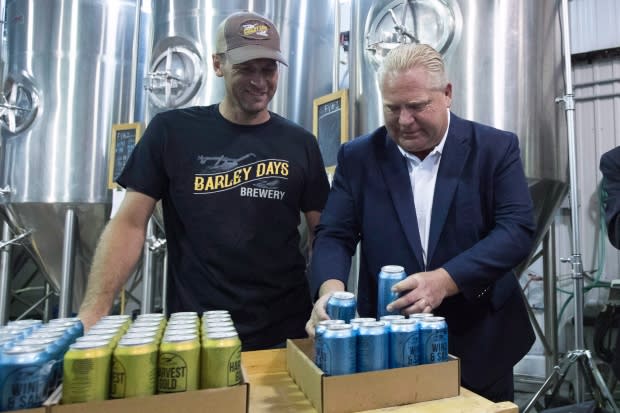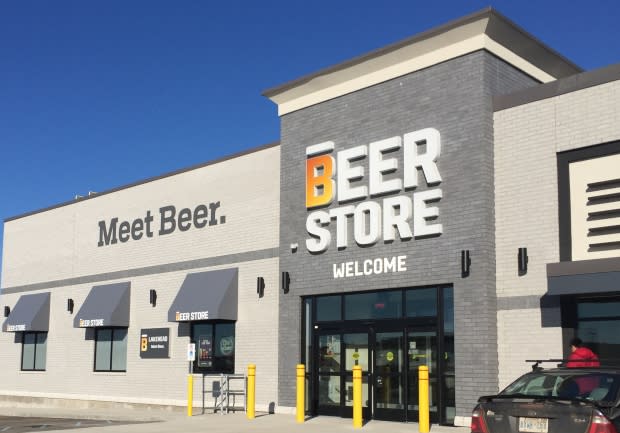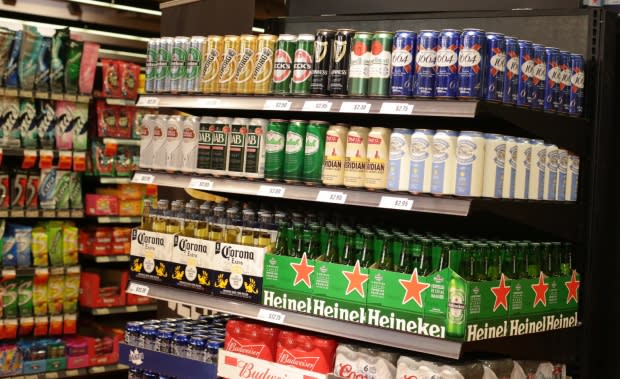Doug Ford's beer promise could create hundreds of millions of dollars in penalties
Ontario taxpayers face footing the bill for hundred of millions of dollars in penalties if Premier Doug Ford forges ahead with his plan to allow convenience stores to sell beer.
In its budget tabled last week, the Ford government reaffirmed its pledge laid out in its throne speech and promised by Ford during the election campaign to throw open the beer retail market to corner stores and big box stores.
Trouble is, there's a big catch stopping this promise from becoming a reality.
A contract between the province, The Beer Store and three big brewers, in place until the end of 2025, limits the number and type of retail outlets that can sell beer in Ontario. Allowing the province's 9,000 convenience stores to sell beer would breach the contract. Any breach of the contract's key terms is subject to penalties.
Beer industry sources tell CBC News the penalties would be significantly more than $100 million, likely running into the hundreds of millions of dollars.

It's all laid out in the contract, a publicly available document called the Master Framework Agreement, signed in 2015 under the then-Liberal government. A close look reveals ironclad provisions that stop the government from simply legislating its way out of the deal without compensating The Beer Store and the breweries.
The agreement is "a legal, valid and binding obligation enforceable against the province."
The contract gives The Beer Store and the brewers the right to "remedies" including a "monetary award," even if the deal is breached because of changes to provincial legislation.
That compensation must be awarded regardless of "the status of the province as the Crown" (in other words, the government can't exempt itself from liability).
How much compensation? The document says an arbitrator must calculate the monetary award "on the basis of the normal principles of damages for breach of contract."
That means the big brewers would have to be compensated both for the immediate losses they incur when the contract is breached and for ongoing losses over its duration.
Sales from The Beer Store and brewery outlets are running at $2.3 billion a year, according to the latest figures from the province. More than six years remain in the contract.

Simple math tells you that eating into even a small percentage of the breweries' revenues would add up to big money, and therefore a big penalty to the province.
The brewers could argue the province is responsible for their increased costs to distribute beer to 9,000 additional locations. The government could face compensating The Beer Store for severance pay to lay off any of its 7,000 staff and fees to terminate leases on any stores it's forced to close.
The Master Framework Agreement required Labatt and Molson to freeze the price of their most popular products for a year after the deal was signed. The contract also required The Beer Store to spend $100 million by 2018 to "improve the customer experience" in its outlets.
That provision alone is why industry sources say the province would be on the hook for far more than $100 million in compensation if it violates the contract. The company spent the money believing that the retail landscape and its business model would be guaranteed to stay the same until 2025.
The Beer Store and the brewers are in hush-hush talks with the government about the contract.
"The discussions are aimed at reaching a mutually agreeable amendment … to improve customer convenience and choice. We cannot disclose the details of these ongoing discussions," said an official with The Beer Store in a statement emailed to CBC News on Wednesday.

"We're going to continue to consult right across the industry over the course of the summer," said Finance Minister Vic Fedeli in an interview Wednesday at Queen's Park.
"I think the premier was pretty clear during the election and since that we want to put beer and wine in corner stores, big box stores, and more grocery stores because we want to offer people more choice and convenience."
Asked whether it would be worth paying hundreds of millions in compensation to make that happen, Fedeli replied, "Well, we don't make any presumptions."
How the beer battle plays out will have political implications for Ford, who talks often about respecting the taxpayers and who — even though he doesn't drink — made a "buck a beer" floor price a signature of his campaign.
Beer in convenience stores certainly won't be cheaper than at The Beer Store, where the brewers set the price.
It's also hard to see how Ford can sell his voters on paying out hundreds of millions of taxpayer dollars to get beer into corner stores. That is, unless he can paint "Big Beer" as the bad guy.
That's a little harder now that The Beer Store is no longer just owned by the big three of Labatt, Molson and Sleeman. It counts 31 brewers, including craft beer makers, among its shareholders.
Ultimately, there remains another political tactic Ford could employ. He could try to pin the blame for the costs on Kathleen Wynne and the previous Liberal government for signing the beer agreement in the first place.

